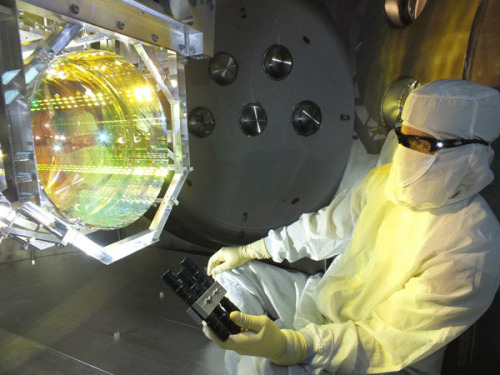
A technician inspects one of the U.S. laboratory's core optics (mirrors) by illuminating its surface at different angles. Caltech/MIT/LIGO Lab
Then where are the "middle pitched" and the "bass" in the universe? Two other programs in China, "FAST" and "Ali", are looking for the two "voice ranges."
In a valley deep in southwest China's mountainous Guizhou Province, a big sensitive "ear" on earth will soon be completed.
The five-hundred-meter aperture spherical radio telescope, or "FAST", operates in the radio frequency of the electromagnetic spectrum where it can detect and collect a wider range of data on radio sources.
Being able to "hear" more subtle sound from the universe, "FAST" is expected to make breakthroughs in surveying natural hydrogen in distant galaxies, detecting faint pulsars, and also finding the "middle pitched" gravitational wave, which is often released by the merging of supermassive black holes.
Another domestic gravitational wave plan "Ali," named after the Chinese Academy of Sciences (CAS) observatory in Ali, Tibet, has totally different objectives -- detecting the first tremors of the Big Bang, or primordial gravitational waves.
Su dubbed the waves as the "lowest pitch" of cosmic symphony. "It's quite faint and difficult to capture," he said.
Considering weather conditions and small interference, scientists regard only four sites on Earth as ideal places for observation for the primordial waves, including the South Pole and Chile's Atacama Desert in the Southern Hemisphere, and Greenland and Ali on the northern part.
Though Ali Project is still awaiting government approval, Harvard, MIT and the University of Chicago have expressed interest, Su said.
"Whether it is right to understand the birth of the universe based on the known physical law needs to be verified through the research of the primordial gravitational waves," he added.
PRELUDE
"When Galileo turned his telescope to the sky 400 years ago, human beings got their first glance of the beauty of the universe," Su Meng said, "but it is not until the latest discovery of gravitational waves that we heard the first note of the cosmic symphony."
"It's only the beginning," Hu Wenrui echoed with Su, saying that with further detection in space, more questions will be answered.
"Though I might not be able to see the launch of the satellites, I do hope this project will make China one of the most important research bases in the world for gravitational wave detection in space," the 80-year-old academician continued.
With the development of fundamental science research, China could take a substantive leap in other related fields such as space science research, high-end space satellite technology etc, Hu said.
Gravitational wave detection has opened a window for us to observe the mysterious cosmos, so it's necessary for us to master the technology, said Wu Yueliang, vice-president of the University of Chinese Academy of Sciences.
Wu also pointed out that China should establish a long-term investment mechanism and provide stable support for basic research.


















































